宝坻区第三中学八年级英语下册 Module 2 Experiences Unit 3 Languag
新外研版八年级英语下册导学案Module 2-Experiences(Unit1-Unit3)
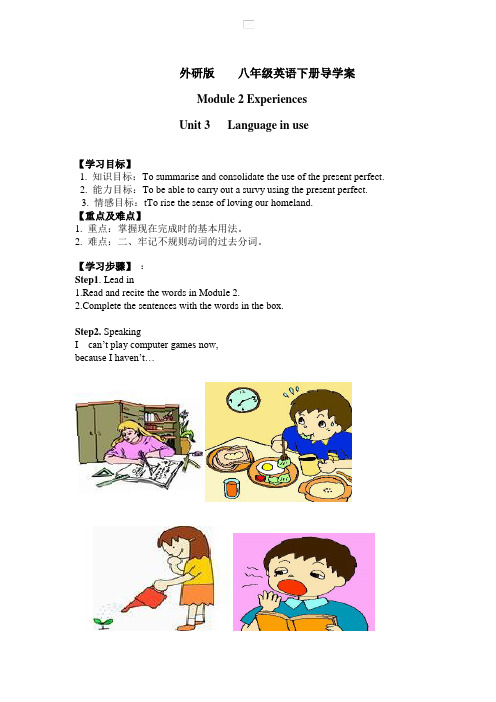
外研版八年级英语下册导学案Module 2 ExperiencesUnit 3 Language in use【学习目标】1. 知识目标:To summarise and consolidate the use of the present perfect.2. 能力目标:To be able to carry out a survy using the present perfect.3. 情感目标:tTo rise the sense of loving our homeland.【重点及难点】1. 重点:掌握现在完成时的基本用法。
2. 难点:二、牢记不规则动词的过去分词。
【学习步骤】:Step1. Lead in1.Read and recite the words in Module2.plete the sentences with the words in the box.Step2. SpeakingI can’t play computer games now,because I haven’t…Step3. Write a questionnaire about your experiences.Have you ever …had a Western meal?lived in another city?entered a singing competition?travelled by train?travelled to the seaside?tried seafood?cooked dinner for your parents?------Yes, I have. / No, I haven’t.Step4 Complete the sentences.1. He/She _____________________ a Western meal.2.He/She ______________________ in another city.3.He/She ______________________ a singing competition.4. He/She _____________________ by train.5.He/She ______________________ the seaside.6.He/She ______________________ seafood.7.He/She ______________________ for his/her parents.Step5. Complete the postcard. Use the list of Things to do in China to help you.Things to do in China!------go to Beijing,see the Beijing Opera,climb the Great Wall,eat Beijing duck,visit the Palace MuseumStep6 Activity4Dear David,I’m having a wonderful time in China. I’ve done so many things!I’ve__________________________________________________________________________________ ___________________________________________________________ There’s only one thing I haven’t don e :I...______________________________________Bye for now,RobStep7. Complete the sentences with the words in the box.afford, competition, pronounce, spell, tower1.I wrote a story for a(n) ___________ in my English class and I won a prize.2.Alice can _______ very well, and what's more, she can write beautifully.3.Some English words are difficult to ____________.4.We visited an ancient palace with a tall_______ and a beautiful garden.5.Mary wants to visit the US, but the plane tickets are very expensive and she cannot ______ to go.Step8.Listen and check (√) the correct answer.Places visitedPeople China Europe USAWinnieDianaBobStep9. Listen again and answer the questions.1. ( ) How many times has Winnie been to the US?A. two timesB. three timesC. four times2. ( ) Where would Diana like to go again?A. the USB. EnglandC. China3. ( ) Which part of China has Diana travelled around?A. NorthB. SouthC. West4. ( ) How did Diana travel there?A. by boatB. by trainC. by plane5. ( ) Has Bob ever visited Germany?A. No, he hasn’tB. Yes, he has【知识结构】(一)、Grammar现在完成时如果你想说“我已经看过某部电影,所以不想看了” “某人曾经做过什么事情”等等,该如何表达呢?首先请看下面的句子:(1)I have seen the f ilm. I don’t want to see it again.(2) Have you ever read a travel brochure?(3) I have never visited the USA.以上句子的谓语动词有一个共同的特点就是“have/has+动词的过去分词”, 用于表示在以前的某个时间曾经做过的、发生的事情,这种行为对目前有某种影响,如(1); 还可以表示到目前为止曾经经历或没经历的事情,如(2)(3)。
外研版英语八年级下册 Module2Unit3课件 (共46张PPT)
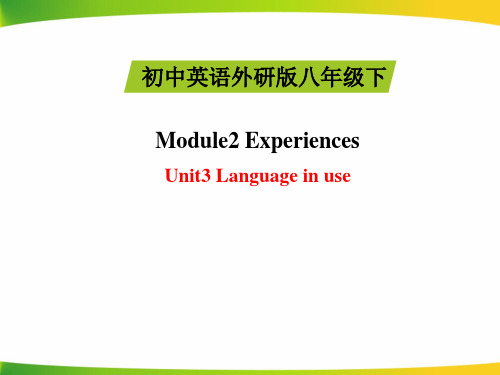
4. How did Diana travel there? She travelled there by train.
5. Has Bob ever visited Germany? Yes, he has. He’s been all over Europe.
8 Complete the passage with the sentences in the box. There is one extra sentence.
2) live in another city Have you ever lived in another city?
3) enter a singing competition
Have you ever entered a singing competition?
4) travel by train
2) Alice can _sp__el_l_/p_r_o_n_o_u_n_c_e_ very well, and what’s more, she can write beautifully.
3) Some English words are difficult to _p_r_o_n_o_u_n_c_e_/s_p_e_l_l __.
2. I haven’t _tr_a_v_e_l_le_d_ much. 3.They _h_a_v_e_ _b_e_e_n_ to many interesting
places.
Summary
现在完成时
一、句式结构
1. 肯定句式: 主语+have / has+动词过去分词+其他。 2. 否定句式: 主语+have / has+not+动词过去分词+ 其他。
(外研社版)初中英语八年级下册 Module 2单元测试(三)附答案

Module 2 Experiences 单元测试Ⅰ.听力(20分)(Ⅰ)听句子,选择适当答语,每个句子读两遍。
(5分)1. A. Yes, I do. B. Yes, I did. C. Yes, I have.2. A. Good luck! B. Not at all. C. It doesn’t matter.3. A. What’s up? B. Enjoy yourself! C. That sounds wonderful!4. A. That’s a pity! B. Well done! C. That’s nothing.5. A. In ten years. B. For ten years. C. Ten years ago.(Ⅰ)听五组小对话,选择与其相符的图画,每组对话听一遍。
有一幅图片多余。
(5分)A B CD E D6. ________7. ________8. ________9. ________10. ________(Ⅰ)听一段长对话,选择最佳答案,对话读两遍。
(5分)11. Where is Betty from?A. Beijing.B. London.C. New York.12. How long has Betty been in Beijing?A. For about two weeks.B. For about two months.C. For about two years.13. What place hasn’t Betty been to yet?A. The Summer Palace.B. Tian’anmen Square.C. The Great Wall.14. What does Betty want to be?A Chinese teacher. B. An English teacher. C. A doctor.15. What does Betty think of Chinese?A. Boring.B. Easy.C. Difficult.(Ⅰ)听一篇短文,选择最佳答案,短文读两遍。
外研版英语八年级下册Module 2导学案(3节)
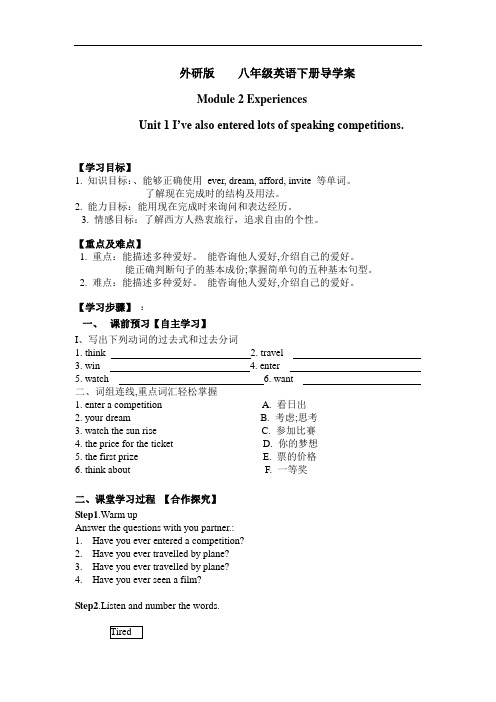
外研版八年级英语下册导学案Module 2 ExperiencesUnit 1 I’ve also entered lots of speaking competitions.【学习目标】1. 知识目标:、能够正确使用ever, dream, afford, invite 等单词。
了解现在完成时的结构及用法。
2. 能力目标:能用现在完成时来询问和表达经历。
3. 情感目标:了解西方人热衷旅行,追求自由的个性。
【重点及难点】1. 重点:能描述多种爱好。
能咨询他人爱好,介绍自己的爱好。
能正确判断句子的基本成份;掌握简单句的五种基本句型。
2. 难点:能描述多种爱好。
能咨询他人爱好,介绍自己的爱好。
【学习步骤】:一、课前预习【自主学习】I、写出下列动词的过去式和过去分词1. think2. travel3. win4. enter5. watch6. want二、词组连线,重点词汇轻松掌握1. enter a competition A. 看日出2. your dream B. 考虑;思考3. watch the sun rise C. 参加比赛4. the price for the ticket D. 你的梦想5. the first prize E. 票的价格6. think about F. 一等奖二、课堂学习过程【合作探究】Step1.Warm upAnswer the questions with you partner.:1. Have you ever entered a competition?2. Have you ever travelled by plane?3. Have you ever travelled by plane?4. Have you ever seen a film?Step2.Listen and number the words.1. Lingling has visited / hasn’t ever visited the US.2. Betty has asked / hasn’t asked her parents.3. Lingling has travelled / hasn’t travelled by plane.Step4. 读对话找出现在完成时的句子。
外研版八年级下册M2U2上课用带知识点课件
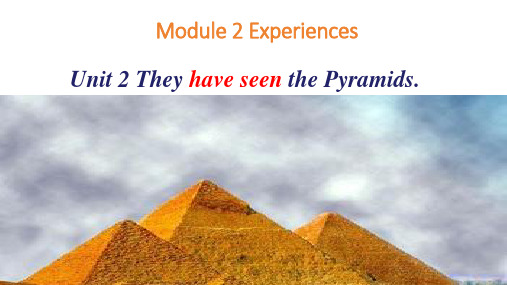
mixture是名词,意为"混合;混合物"。The city is a mixture of old and new buildings.这座城市里新老建筑兼而有之。语境串记Mix them and the mixture will smell terrible. 把它们混合在一起,混合物会发出难闻的气味。
M2U2单词用法
Tips:当我们在阅读旅行文章时,可以使用地图哦!
Task1: Let’s predict 预测
What can we learn from the title(题目) and the picture?
They have seen the pyramids.
A. It’s about learning foreign languages. B. It’s about moving.(搬家) C. It’s about travel experience .
Para1
迈克·罗宾逊是一个15岁的美国男孩,他的妹妹克莱尔14岁。
目前迈克和克莱尔生活在埃及的开罗。开罗是非洲最大、最繁华的城市之一。
Unit 2 They have seen the Pyramids.
2019年春八年级英语下册 Module 2 Experiences Unit 2 They have seen the Pyramids & Unit 3导学 (新
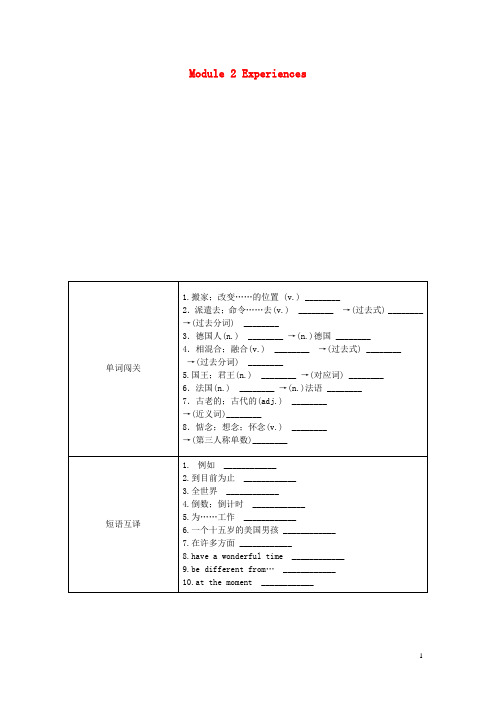
Module 2 Experiences连词成句1.English,is, different, many, Arabic, from, in, ways(阿拉伯语在许多方面与英语不同。
)____________________________________________________2. they, Arabic ,speak ,have, Chinese, to, German, so far,French, and, learnt(到目前为止,他们已经学会说德语、法语、汉语和阿拉伯语。
)____________________________________________________3. many, they, have, places, interesting, been, to(他们去过很多有趣的地方。
)____________________________________________________4. spell, they, hard, to, it, words, and, the, find,pronounce(他们发现在单词的拼写和发音方面很难。
)____________________________________________________课文初探 根据课文内容判断正误,正确的填A,错误的填B 。
( )1.Clare is Peter's sister.( )2.Peter has been to Germany, France, England andChina.( )3.Mike has travelled on a boat on the Nile River. ( )4.Mike can speak Arabic.( )5.Recently, the Robinsons will go back to England..●1 send v. 派遣去;命令……去[观察] The company has offices in many countries, and it has sent Peter to work in Germany, France and China before.这家公司在很多国家都设有办事处,公司以前把彼得派往德国、法国和中国工作过。
2019年春八年级下册英语外研版教案:Module2Unit2Experiences
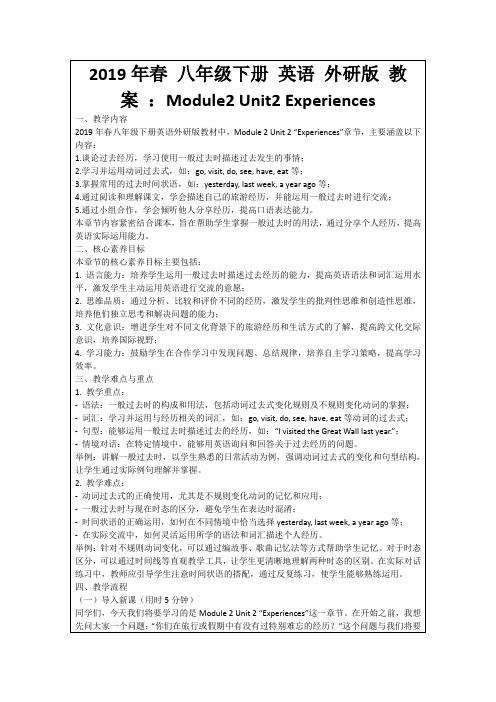
三、教学难点与重点
1.教学重点:
-语法:一般过去时的构成和用法,包括动词过去式变化规则及不规则变化动词的掌握;
-词汇:学习并运用与经历相关的词汇,如:go, visit, do, see, have, eat等动词的过去式;
3.掌握常用的过去时间状语,如:yesterday, last week, a year ago等;
4.通过阅读和理解课文,学会描述自己的旅游经历,并能运用一般过去时进行交流;
5.通过小组合作,学会倾听他人分享经历,提高口语表达能力。
本章节内容紧密结合课本,旨在帮助学生掌握一般过去时的用法,通过分享个人经历,提高英语实际运用能力。
二、核心素养目标
本章节的核心素养目标主要包括:
1.语言能力:培养学生运用一般过去时描述过去经历的能力,提高英语语法和词汇运用水平,激发学生主动运用英语进行交流的意愿;
2.思维品质:通过分析、比较和评价不同的经历,激发学生的批判性思维和创造性思维,培养他们独立思考和解决问题的能力;
3.文化意识:增进学生对不同文化背景下的旅游经历和生活方式的了解,提高跨文化交际意识,培养国际视野;
-动词过去式的正确使用,尤其是不规则变化动词的记忆和应用;
-一般过去时与现在时态的区分,避免学生在表达时混淆;
-时间状语的正确运用,如何在不同情境中恰当选择yesterday, last week, a year ago等;
-在实际交流中,如何灵活运用所学的语法和词汇描述个人经历。
举例:针对不规则动词变化,可以通过编故事、歌曲记忆法等方式帮助学生记忆。对于时态区分,可以通过时间线等直观教学工具,让学生更清晰地理解两种时态的区别。在实际对话练习中,教师应引导学生注意时间状语的搭配,通过反复练习,使学生能够熟练运用。
外研版初中八年级下册英语知识梳理 Module 2 Units 2~3

Units 2~3
外研·八年级下 册
单词串 烧
Today many people move to big cities to make a living. Zhang Heng is one of them. He moved to Shanghai five years ago and worked in a car company. The company has offices in many countries. It has sent him to work in Germany and France before. Last month, the company decided to send Zhang Heng to
5. 温妮去过美国几次? How many times has Winnie been to
the US? (How many times…?) 6. 你热爱大自然并想保护森林安全吗?
Do you love nature and want to keep forests safe?
Zhang Heng has always wanted to visit the palaces and towers of ancient kings and queens. So he was happy at first. However, things became difficult after he arrived there. He found it hard to talk in Arabic with the local people. The language is different from Chinese in many ways. Sometimes he even mixed the two languages. And he misses his
- 1、下载文档前请自行甄别文档内容的完整性,平台不提供额外的编辑、内容补充、找答案等附加服务。
- 2、"仅部分预览"的文档,不可在线预览部分如存在完整性等问题,可反馈申请退款(可完整预览的文档不适用该条件!)。
- 3、如文档侵犯您的权益,请联系客服反馈,我们会尽快为您处理(人工客服工作时间:9:00-18:30)。
Unit 3 Language in useⅠ.写出下列单词的过去式和过去分词1.go2.do3.make4.find5.see6.be7.begin8.send9.learn10.haveⅡ.用括号内所给单词的适当形式填空11.—Is The Smurfs2 a very interesting film?—Sorry, I (not see) it before.12.We had to stop (drive) as the traffic lights turned red.13.—The boy finds it hard (solve) the problem by himself.—Let′s go and help him.14.So far we (learn) over 1,000 English words.15.Zhong Nanshan is one of the (famous) doctors in China.Ⅲ.用方框中所给词语的适当形式填空,每词限用一次16.To make more money, many people to big cities.17.There was a big fire in in April, 2019, which burned a famous old building.18.What a strange smell! Have you lemon juice and milk, Linda?19.What do you think of the show ?20.In some , your school is different from mine.Ⅳ.句型转换21.I have had lunch at school. (改为一般疑问句,并作否定回答)— you lunch at school?—, I .22.Diana travelled to Egypt by plane. (对画线部分提问)Diana to Egypt?23.My grandma has lived here for fifty years. (对画线部分提问)your grandma lived here?24.She has been to Paris twice. (对画线部分提问)she been to Paris?25.Amy gave Eric a nice watch for his birthday. (改为现在完成时)Amy Eric a nice watch for his birthday.Ⅴ.完形填空Most of us like to know where we are and where we′re going. It can feel strange to be 26 . The words “being lost” make us think of a dark and scary wood or street, 27 that′s not always the case.Once we were on holiday in Venice. My dad planned to go out to take photos early the next morning. Mum wasn′t 28 , but I would go with him, only because he 29 I could have the biggest ever bowl of Italian ice cream if I did. 30 else would I get up so early?!So at 5 am the next day we left the hotel and started walking in the 31 streets. When the sun came up, Dad started taking photos and I 32 him, down small streets and over little bridges.After about an hour, I turned to Dad and asked, “Where are we?” He said, “I have no idea.”I immediately felt a bit 33 , but Dad just laughed and said, “We′re lost!” I told him to 34 his map or phone. He said, “I only brought the 35 . Come on, let′s get more lost!” He laughed again.His laughter 36 me and made me feel safe. Slowly people were appearing on the streets—shops and cafes began to open.I began to 37 that we were lost, and just started watching and taking in everything that was happening around me.38 , after about four hours of walking around, we were back. Mum asked anxiously(担心地), “Where have you been?” I said with a big 39 , “We got lost!”These days we 40 get lost with so many things around us—maps, GPS, apps on our phones, and so on. But Dad showed me that being lost can sometimes simply be something to enjoy.( )26.A.alone B.lost C.afraid D.silent( )27.A.or B.so C.but D.and( )29.A.expected B.realised C.remembered D.promised( )30.A.How B.Why C.When D.Where( )31.A.modern B.noisy C.empty D.bright( )32.A.left B.invited C.guided D.followed( )33.A.scared B.hurt C.hungry D.tired( )34.A.pick up B.think of C.take out D.pay for( )35.A.map B.bowl C.phone D.camera( )36.A.saved B.relaxed C.stopped D.warned( )37.A.doubt B.forget C.imagine D.regret( )38.A.Finally B.Recently C.Certainly D.Suddenly( )39.A.surprise B.shame C.smile D.fear( )40.A.hardly B.often C.nearly D.alwaysⅥ.阅读理解Ever since I was a little girl, I′ve loved reading crime and detective(侦探) novels, so I guess it was pretty normal that I started writing them when I was older. However, my family is very big on having a traditional job and so when I said that I wanted to go to college and study writing, my parents told me that I couldn′t. They told me that I had to study for a degree so that I would get a good job, and not something as risky as writing. I think I could have studied journalism(新闻专业), but I didn′t want to lose interest in writing because it would be something I would do every day for work, not for pleasure. I thought that teaching looked like a pretty good compromise(妥协), especially because of the long holidays. It was a good choice: by the time I was twenty-five, I′d already finished two novels and had an agent.To be honest, I never meant to keep my being a crime writer a secret or anything, and my friends have always known. One of the reasons most people don′t know is because my agent told me that my name Hazel sounded too much like a romance(浪漫) novelist for older women. She suggested Brooke Lane and I thought, “Well, if you think it′ll make me successful, okay.” I′d completely forgotten about it till I walked into school one day and saw one of my workmates reading my novel. I asked her some questions about it, and it was so clear that she had no idea that I′d written it—she even offered to lend it to me after she′d finished! Of course, sometimes I want to know what my students would think if they knew that their teacher was going home on the weekend to write about crime and detective, but I think my parents probably did me a favour: my teaching job keeps me in touch with the real world.A.an agentB.a businessmanC.a teacher and an artistD.a teacher and writer( )42.The underlined words “is very big on” in the passage most probably mean “”.A.to give no adviceB.to like something very muchC.to have more experiencesD.to misunderstand something( )43.It′s clear that Hazel .A.agreed to study business for a degreeB.accepted Brooke Lane as her pen nameC.would like to write something for teachingD.told her workmates about her writing novels( )44.Hazel finally knew that her parents′ advice on her career was .A.helpfulB.excitingC.carelessD.bad( )45.From the passage, we can know that .A.Hazel likes showing off in publicB.Hazel′s students all want to write novelsC.Hazel′s agent has helped the writer′s writing a lotD.older women prefer the name Brooke to Hazel答案Ⅰ.1.went; gone2.did; done3.made; made4.found; found5.saw; seen6.was/were; been7.began; begun8.sent; sent9.learnt/learned; learnt/learned10.had; hadⅡ.11.haven′t seen12.driving13.to solve14.have learned/learnt15.most famousⅢ.16.move/moved17.France18.mixed19.so far20.waysⅣ.21.Have; had; No; haven′t22.How did; travel23.How long has24.How many times has25.has givenⅤ.【主旨大意】本文是一篇记叙文。
